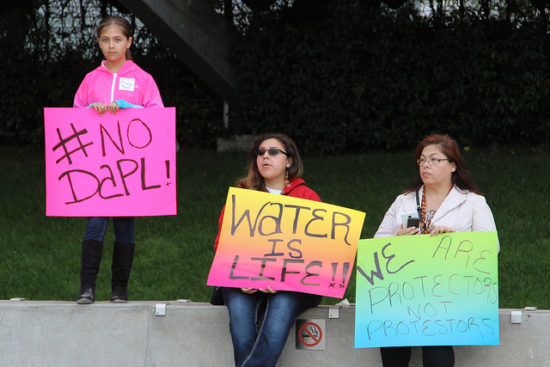
August 24, 2016; New York Times
“It is a spectacular sight: thousands of Indians camped on the banks of the Cannonball River, on the edge of the Standing Rock Sioux Reservation in North Dakota. Our elders of the Seven Council Fires, as the Oceti Sakowin, or Great Sioux Nation, is known, sit in deliberation and prayer, awaiting a federal court decision on whether construction of a $3.7 billion oil pipeline from the Bakken region to Southern Illinois will be halted.”
So begins an op-ed written by David Archambault II in the New York Times last week. Archambault is the chairman of the Standing Rock Sioux tribe and one of hundreds of encamped protestors seeking to halt the Dakota Access oil pipeline, which is scheduled to be nearly 1,170 miles long, just a few miles short of the length of the now-defunct Keystone XL pipeline. Dakota Access has been designed to transfer oil from the Bakken shale fields in western North Dakota to southern Illinois, where it will be transferred to a different pipeline under construction and sent to refineries in Texas. Currently, about 40 percent of Bakken shale oil is transported using existing pipelines and just over half is shipped by rail.
Archambault says in his editorial that the permitting process was fast-tracked, and in response, the Standing Rock Sioux tribe has sued to block the pipeline and has asked the judge to issue an injunction. A hearing will be held this Wednesday on the matter, but meanwhile, demonstrators are doing their best to interfere with work on an access road to the site.
The tribe claims that the United States Army Corps of Engineers failed to do proper cultural and historical reviews before granting federal approvals. Writes Archambault:
Sign up for our free newsletters
Subscribe to NPQ's newsletters to have our top stories delivered directly to your inbox.
By signing up, you agree to our privacy policy and terms of use, and to receive messages from NPQ and our partners.
Our tribe has opposed the Dakota Access pipeline since we first learned about it in 2014. Although federal law requires the Corps of Engineers to consult with the tribe about its sovereign interests, permits for the project were approved and construction began without meaningful consultation. The Environmental Protection Agency, the Department of the Interior and the National Advisory Council on Historic Preservation supported more protection of the tribe’s cultural heritage, but the Corps of Engineers and Energy Transfer Partners turned a blind eye to our rights. The first draft of the company’s assessment of the planned route through our treaty and ancestral lands did not even mention our tribe.
The Dakota Access pipeline was fast-tracked from Day 1 using the Nationwide Permit No. 12 process, which grants exemption from environmental reviews required by the Clean Water Act and the National Environmental Policy Act by treating the pipeline as a series of small construction sites. And unlike the better-known Keystone XL project, which was finally canceled by the Obama administration last year, the Dakota Access project does not cross an international border—the condition that mandated the more rigorous federal assessment of the Keystone pipeline’s economic justification and environmental impacts.
Neither is the tribe happy about the appropriation of its identity in the name of the pipeline, “This is our homeland,” said Phyllis Young, a member of the Standing Rock Sioux. “We are Dakota. ‘Dakota’ means ‘friend’ or ‘ally.’ Dakota Access has taken our name.”
The Army Corps of Engineers responded by saying it did consult extensively with affected tribes, including the Standing Rock Sioux, but they could not identify any specific cultural sites that would be damaged by the pipeline.
Numbers at the demonstration have grown; environmental activists and other tribes from the Dakotas, the rest of the Great Plains, and the Pacific Northwest have been arriving to the camp from which the protestors march or ride their horses to the site every morning. Archambault says there are 90 tribes represented at the encampment and calls the moment a tipping point.
When the Army Corps of Engineers dammed the Missouri River in 1958, it took our riverfront forests, fruit orchards and most fertile farmland to create Lake Oahe. Now the Corps is taking our clean water and sacred places by approving this river crossing. Whether it’s gold from the Black Hills or hydropower from the Missouri or oil pipelines that threaten our ancestral inheritance, the tribes have always paid the price for America’s prosperity.
Energy Transfer Partners has declared its intention to finish construction on the $3.7 billion project by year’s end. It concedes that it stopped work here this month while “law enforcement works to contain the unlawful protests,” but that elsewhere, the work was proceeding as planned. ETP has also filed suit in federal court over the protests, accusing seven leaders of leading the effort to block access to the construction site, threatening workers, and trespassing on private land.—Ruth McCambridge













